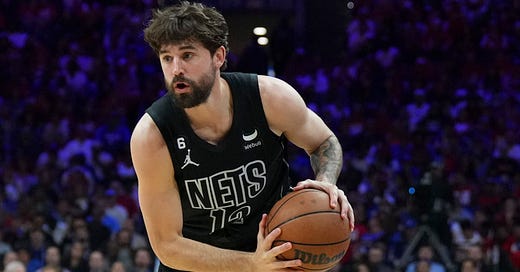Sentiment Aside, Harris Trade Was Proper Business Decision For Nets
It couldn’t have been easy for Sean Marks to sign off on the reported trade of wing Joe Harris to Detroit. For if a single player embodied how the Nets general manager was able to rebuild a franchise from ashes, it was Harris.
However, it had to be done, with some folks possibly arguing it came a few years too late. In order to dump Harris’ approximately $19.9 million salary, the last of a 4-year, $75 million deal he signed in the 2020 offseason, Brooklyn had to grease the Pistons’ wheels with a pair of second-round picks—one in 2027 via Dallas and the other in 2029 that originated with Milwaukee.
The Nets, once again in transition following February’s blow-up of their superstar window, gained the flexibility of starting out the new league year under the $136 million salary cap. That will allow them the opportunity to utilize a full, non-taxpayer mid-level exception of approximately $12.4 million before recording the assumed re-signing of restricted free agent Cam Johnson (as an aside bonus, the Pistons, rumored to be one of Johnson’s suitors when the market opens, no longer has the cap space). In addition, the maneuver created a hefty, dollar-for-dollar trade exception. Hello, Dejounte Murray?
With the Nets currently rostering a wing glut, Harris probably was going to have difficulty breaking into the rotation. The ankle woes that prematurely ended his 2021-22 campaign seemed to affect his already limited athleticism last season, though he did gut through it by missing only eight games. It seemed Head Coach Jacque Vaughn only gave him playoff minutes as a reward for past services, and Harris then proceeded to gag those opportunities to the tune of 2-for-13 shooting from the field, including 1-for-12 from three-point lands, over the four-game sweep by Philadelphia.
Like Marks, Vaughn was also on hand when the Virginia product arrived in Brooklyn in the summer of 2016 as a relatively unknown player with 56 NBA games under his belt over two seasons in Cleveland before being traded to Orlando and immediately waived. The fan reaction to Harris signing a 2-year deal for approximately $1 million per year was, “Who?”
Over the next seven seasons, we got to know Joe, or “Joey Buckets,” or “Lumberjack Joe,” or “Beef Jerky Joe,” or whatever was the nickname du jour. What mattered was that, when he was right, he was a weapon. He shot a scorching 44% from three-point range as a Net, winning the league’s three-point crown twice and defeating Warriors icon Stephen Curry in the finals of the three-point contest at the 2019 NBA All-Star Game.
For a fan base that had been through hell following the Kevin Garnett/Paul Pierce debacle, it was a time to celebrate one of our own, even if technically he was a Cleveland second-round pick. For Harris really did grow up in Brooklyn’s development program, adding components to his game every year. Before his injury, he became somewhat lethal at driving closeouts and finishing at the basket with a wide array of spins.
Harris was never going to be an elite defender—opponents never stopped targeting him during key moments—but no one could question his effort. He’d fight for every loose ball and rebound.
Off the court, Harris embraced Brooklyn, especially the diverse food selections. Though his responses tended toward the cliché, he was always cordial with the media and seemed to be well-liked in the locker room.
That Harris managed to survive all the turbulence of those seven seasons—from laughingstock to plucky go-getters, followed by the short-lived Big 3 era and its destruction—speaks volumes about his character and professionalism. The title of the continuous longest-serving Net now belongs to center Nic Claxton, who is entering his fifth season.
Unfortunately, in the business of pro sports, the business part sometimes has to go to the forefront. And it was a good thing that Marks understood that it was good business for the Nets to part ways with Harris.



